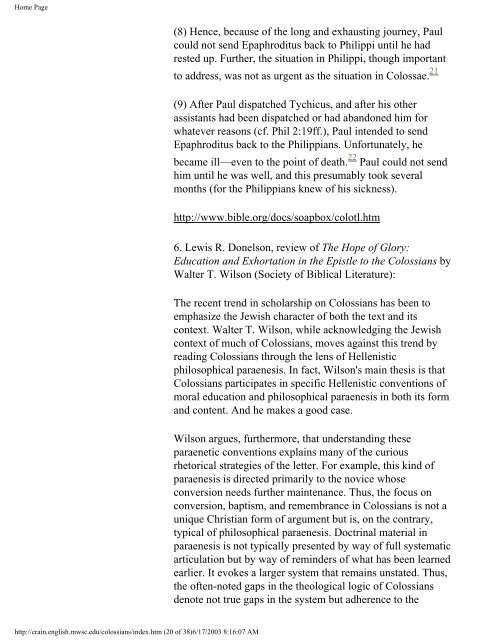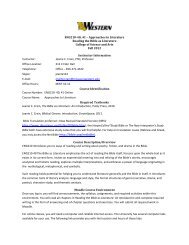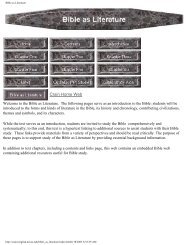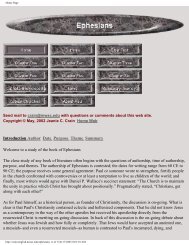Introduction to Colossians: Authorship, Date, Audience - Crain Home
Introduction to Colossians: Authorship, Date, Audience - Crain Home
Introduction to Colossians: Authorship, Date, Audience - Crain Home
You also want an ePaper? Increase the reach of your titles
YUMPU automatically turns print PDFs into web optimized ePapers that Google loves.
<strong>Home</strong> Page<br />
http://crain.english.mwsc.edu/colossians/index.htm (20 of 38)6/17/2003 8:16:07 AM<br />
(8) Hence, because of the long and exhausting journey, Paul<br />
could not send Epaphroditus back <strong>to</strong> Philippi until he had<br />
rested up. Further, the situation in Philippi, though important<br />
<strong>to</strong> address, was not as urgent as the situation in Colossae. 21<br />
(9) After Paul dispatched Tychicus, and after his other<br />
assistants had been dispatched or had abandoned him for<br />
whatever reasons (cf. Phil 2:19ff.), Paul intended <strong>to</strong> send<br />
Epaphroditus back <strong>to</strong> the Philippians. Unfortunately, he<br />
became ill—even <strong>to</strong> the point of death. 22 Paul could not send<br />
him until he was well, and this presumably <strong>to</strong>ok several<br />
months (for the Philippians knew of his sickness).<br />
http://www.bible.org/docs/soapbox/colotl.htm<br />
6. Lewis R. Donelson, review of The Hope of Glory:<br />
Education and Exhortation in the Epistle <strong>to</strong> the <strong>Colossians</strong> by<br />
Walter T. Wilson (Society of Biblical Literature):<br />
The recent trend in scholarship on <strong>Colossians</strong> has been <strong>to</strong><br />
emphasize the Jewish character of both the text and its<br />
context. Walter T. Wilson, while acknowledging the Jewish<br />
context of much of <strong>Colossians</strong>, moves against this trend by<br />
reading <strong>Colossians</strong> through the lens of Hellenistic<br />
philosophical paraenesis. In fact, Wilson's main thesis is that<br />
<strong>Colossians</strong> participates in specific Hellenistic conventions of<br />
moral education and philosophical paraenesis in both its form<br />
and content. And he makes a good case.<br />
Wilson argues, furthermore, that understanding these<br />
paraenetic conventions explains many of the curious<br />
rhe<strong>to</strong>rical strategies of the letter. For example, this kind of<br />
paraenesis is directed primarily <strong>to</strong> the novice whose<br />
conversion needs further maintenance. Thus, the focus on<br />
conversion, baptism, and remembrance in <strong>Colossians</strong> is not a<br />
unique Christian form of argument but is, on the contrary,<br />
typical of philosophical paraenesis. Doctrinal material in<br />
paraenesis is not typically presented by way of full systematic<br />
articulation but by way of reminders of what has been learned<br />
earlier. It evokes a larger system that remains unstated. Thus,<br />
the often-noted gaps in the theological logic of <strong>Colossians</strong><br />
denote not true gaps in the system but adherence <strong>to</strong> the






![[38cb1273][0][sourcelist][1][0] - Crain Home](https://img.yumpu.com/2168350/1/190x245/38cb12730sourcelist10-crain-home.jpg?quality=85)